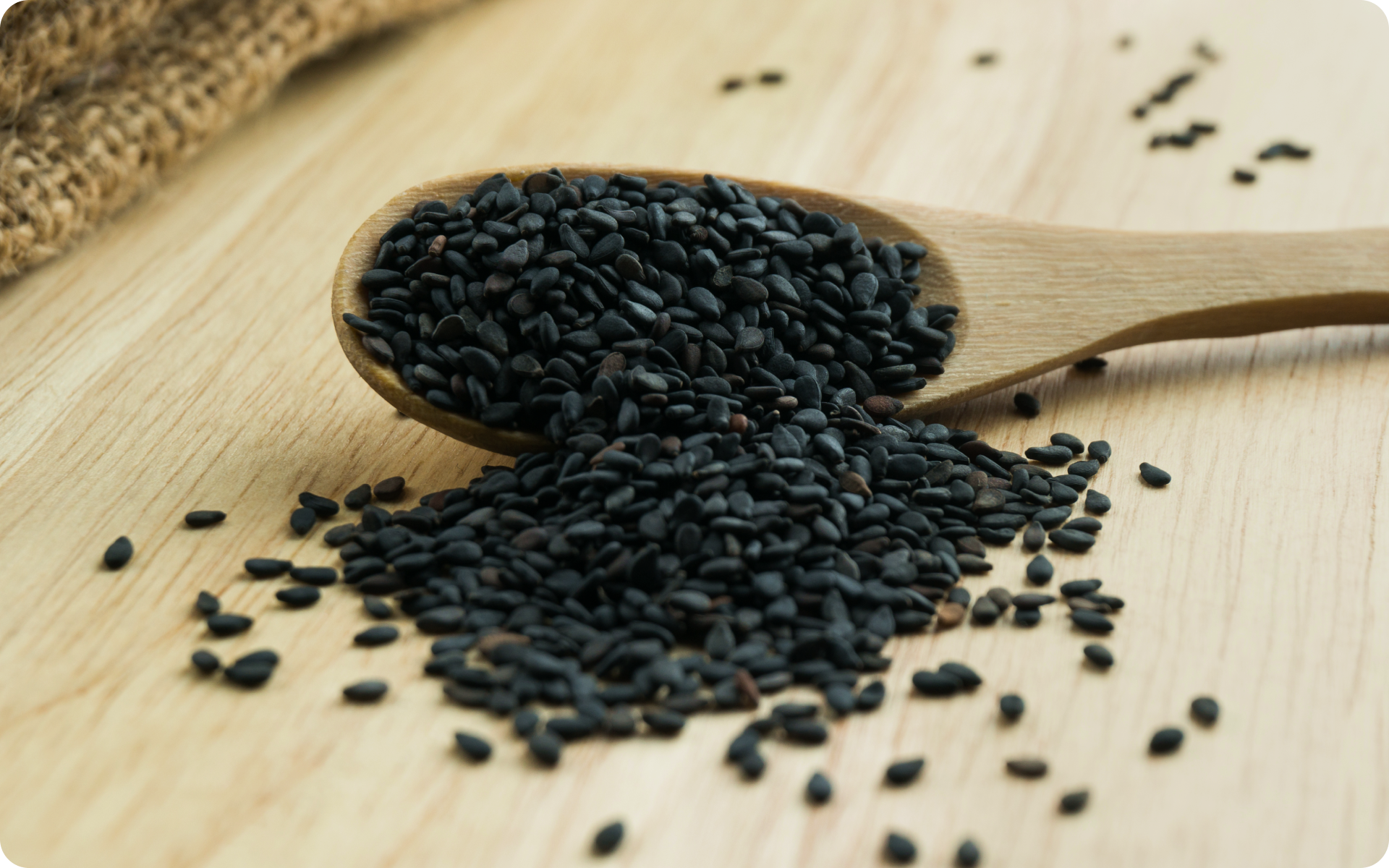Black sesame seeds are also known as black-colored sesame seeds, gingili, til, or zi-er bu in Chinese. They come from a specific variety of the Sesamum indicium plant and have a mild nutty flavor with a hint of bitterness. They are also quite oily.
Black sesame seeds are used as a substitute for white sesame seeds as they retain their original flavor, texture, and aroma. They are also a great, gluten-free alternative for making flour. In Asian countries, products including ice cream, pastries, macaroons, and noodles are often made using black sesame seed paste to give them an extra kick of flavor.
However, it is now possible to find products containing the whole black sesame seed too. For thousands of years, these little seeds have been an important part of Chinese culture and several other cultures throughout Asia due to their health benefits and their ability to be used in so many different types of dishes.
In this article, we discuss black sesame seeds, their nutritional content, and their importance to our diet, in addition to how they can improve your health.
Black Sesame Seeds Nutrition Facts
According to the US Department of Agriculture (USDA), two tablespoons of black sesame seeds contain 100 calories and the following nutrients (1):
- Protein: 3 grams
- Fat: 9 grams
- Carbs: 4 grams
- Fiber: 2 grams
- Calcium: 18% of the daily value (DV)
- Magnesium: 16% of the DV
- Phosphorus: 11% of the DV
- Copper: 37% of the DV
- Manganese: 22% of the DV
- Iron: 15% of the DV
- Zinc: 9% of the DV
- Saturated fat: 1 gram
- Monounsaturated fat: 3 grams
- Polyunsaturated fat: 4 grams
Intense sweat sessions, working weight loss tips, lip-smacking recipes come in one package with the BetterMe app. And all of it is at your fingertips, start transforming your life now!
Black Sesame Seeds Health Benefits
Black sesame seeds are rich in nutrients that support optimal health and eating them regularly may have certain benefits.
May Help Reduce Oxidative Stress
People who are living with chronic disease often experience oxidative stress, which is damage to cells that is caused by free radicals. Research has suggested that black sesame seeds contain antioxidants that may help reduce oxidative stress in the body (1).
Promote Proper Thyroid Function
Sesame seeds are a good source of dietary selenium, a trace mineral that supports proper thyroid function and plays an important role in making thyroid hormones. Thyroid hormones stimulate metabolic activity and a deficiency can lead to weight gain. This study shows that the symptoms of participants with mild autoimmune thyroiditis who took selenium supplements improved (5).
Encourage Heart Health
It has been suggested that black sesame seed phenolic extracts help reduce total and LDL (bad) cholesterol levels, thereby potentially reducing the risk for atherosclerosis and cardiovascular disease. Sesame seeds are also high in fiber, which can help reduce bad cholesterol levels in the bloodstream (2).
Both black and white sesame seeds contain magnesium, which plays a central role in heart health. Eating just one ounce of either kind of seed provides approximately 20% of the daily value of this important mineral that helps keep your blood vessels healthy (1).
It also supports general cardiovascular function, helps regulate blood pressure, and prevents hypertension. Magnesium can even help muscles relax and reduce muscle cramps.
Nourish Your Skin From the Inside Out
Due to their high omega-3 fatty acid content, black sesame seeds may help maintain the health of your skin (6). Eating them regularly can help promote elasticity, protect against free radicals, and have an anti-inflammatory effect.
Black sesame seeds are also an excellent source of protein, which may help build collagen in the skin (12). If you’re looking for naturally beautiful skin, you should include black sesame seeds in your diet.
Improve Digestion
Black sesame seeds are a great source of dietary fiber, which is known to support digestive health (6).
Boost Your Energy Levels
Sesame seeds contain a high amount of thiamin, which contributes to energy production and cellular metabolism by helping transform food into glucose (i.e. fuel) for the body. If you need a little boost after your morning run or before you head to work, you should consider snacking on black sesame seeds – two tablespoons have approximately 9% of your daily value for this essential B vitamin (1).
Support Brain Function and Mood
Black sesame seeds are rich in tryptophan, an amino acid that helps with the production of the neurotransmitter serotonin, which can help soothe and relax you and improve both your mood and sleep quality (10). They also contain significant amounts of vitamin B6, folate, manganese, copper, iron, and zinc, all of which are important for supporting brain health and function (13).
Boost Blood Sugar Regulation
Black sesame seeds are rich in fiber and protein, both of which are important for the regulation of blood sugar levels.
Their magnesium content may also help improve insulin sensitivity (i.e. how well the body responds to the hormone that regulates blood sugar), which can be helpful for diabetics or pre-diabetics who struggle with insulin resistance due to obesity or metabolic syndrome (3).
However, if you have diabetes or pre-diabetes (glucose intolerance), it’s important that you consult your doctor before consuming black sesame seeds on a regular basis, particularly if you’re taking any medications, as they can impact blood sugar levels.
Read more: Kalonji Seeds For Weight Loss: How Practical Are These So-Called Magic-Seeds in Weight Loss?
Fight Cancers
Black sesame seeds contain cancer-fighting compounds including phytosterols, essential fatty acids, antioxidants, selenium, and other minerals that act as chelating agents. They bind to free radicals, which potentially reduces the risk of certain cancers (2). The best part is you can get all of these benefits without sacrificing flavor or texture.
Grow Stronger Bones
Black sesame seeds are rich in minerals such as calcium, magnesium, manganese, copper, phosphorus, potassium, and zinc, which are essential for strong teeth and bones. Consuming black sesame seeds may help prevent future fractures by helping you absorb important bone-building nutrients more effectively (2).
How to Use Black Sesame Seeds
These seeds are incredibly versatile in terms of their culinary use. Here are some of the most common uses of black sesame seeds:
As a Topping
These seeds can be sprinkled on salads or over stir-fries, noodles, vegetables, rice dishes (such as sushi), desserts, and breakfast cereals. They’re also great when sprinkled onto yogurt or apple slices for an afternoon snack.
In Sauces
Black sesame seeds are commonly added to thicken sauces such as teriyaki sauce. They can also be combined with soy sauce and garlic to make black bean sauce, which is used in many Asian cuisines – particularly Chinese. These ingredients can be drizzled with oil over cooked vegetables or steamed fish for a simple but flavorful meal at any time of the day.
As a Condiment
Black sesame seeds are unique as they don’t need to be ground up before eating. After heating them in water for approximately 10 minutes, they’re ready to eat. You can also sprinkle them on fresh meals such as steamed fish or vegetable dishes immediately before serving.
Black sesame seeds are wonderful in stir-fries and other Asian recipes.
As a Sweetener
Black sesame seeds make an excellent natural sweetener that is more nutritious than some alternatives.
To process the seeds into powder form, simply grind them together with some salt using a mortar and pestle or spice grinder until they’re fine, which will take approximately 5-10 minutes. The result should be a fine powder that is fantastic for sweetening up dishes such as porridge, fruit salad, yogurt, cocktails, oatmeal, pancakes, toast, and ice cream
As Tahini Paste
Once you’ve ground the seeds into a powder, you can make them into a paste using some oil. The paste can be used as an excellent alternative to tahini sauce, which is typically made using white sesame seeds.
As Oil
Black seed oil is often used as a natural alternative to ordinary vegetable oil. It adds a deep, rich flavor that is perfect for wok-fried dishes and also contains high levels of antioxidants that help preserve the freshness and color of food.
As a Skin Conditioner
Black sesame seeds can be mixed with olive or coconut oils and applied directly onto the skin to treat conditions such as dry and cracked feet, minor burns, psoriasis, and eczema. Black sesame seed oil is also believed to improve symptoms associated with chronic skin conditions when it is applied topically (12).
Note: The effectiveness of this treatment is dependent on the application method, type of condition being treated, symptoms, and how long the symptoms have been present. You should consult a healthcare provider before trying this or any other home remedy and it is not a replacement for any prescribed medical treatments.
As a Supplement
Black seed oil is often taken orally in capsule form as a supplement for improving immunity, helping digestion, boosting energy levels, and helping with asthma symptoms. More research is required on these effects before black seed oil can be recommended as a treatment.
Note: Make sure your product contains 100% pure black sesame seed oil for maximum potency. You may also consider using whole roasted seeds rather than supplements due to their high nutrient density compared to processed oils. You can read more on this in our sesame seeds facts blog.
Whether you’re looking to simply pep up your fitness routine, jazz up your diet with mouth-watering low-calorie recipes or want to get your act together and significantly drop that number on your scale – BetterMe app has got you covered! Improve your body and revamp your life with us!
Potential Side Effects of Black Sesame Seeds
Although they’re generally fairly safe and easy to use, black sesame seeds can have adverse effects for people with pre-existing medical conditions or low immune systems. Some examples include:
Hypoglycemia
Eating too many black sesame seeds may lower blood sugar, potentially causing hypoglycemic episodes, particularly in people with diabetes who are taking blood sugar-lowering medications or insulin(7). Therefore, these people should avoid consuming these seeds on a regular basis before consulting their doctor about it.
Low Blood Pressure
Sesame may also lower blood pressure, particularly when it is used in medicinal amounts (higher than typical food consumption). If you have low blood pressure or are taking blood pressure-lowering medications, you should talk to your doctor about adding sesame to your diet, particularly if you’re thinking about using supplements (2).
Food Allergy Reactions
Sesame is a common allergen and can cause serious allergic reactions in those who are sensitive to them (8).
What’s the Difference Between Black Sesame Seeds and White Sesame Seeds?
The main difference between black and white sesame seeds is their color. White sesame seeds are light in color when unprocessed, but turn brown after roasting, whereas black sesame seeds stay shiny and jet-black after roasting.
They also have a distinct nutty flavor that’s more intense than the regular white or brown varieties. In addition, it takes approximately 10 minutes to roast black sesame seeds, while it only takes a few minutes to roast the white seeds.
Warnings
To avoid adverse reactions from the consumption of black sesame seeds, you should follow these guidelines:
- Store them in an airtight container in the fridge or freezer to prevent oxidation and rancidity.
- Keep them away from sources of moisture and light, as this can make the seeds go bad more quickly.
- Start by adding small amounts to your diet and gradually increase if you have no adverse reactions.
- Avoid consuming them if you have an allergy to sesame seeds or are sensitive to nuts and seeds in general.
- Consult a healthcare professional before using black sesame seeds as a supplement, particularly if you have pre-existing medical conditions or are taking medications that may interact with the seeds.
Read more: Poppy Seeds Nutrition Facts: Benefits, Side Effects And More
FAQs
Can I eat black sesame seeds every day?
Yes, you can eat black sesame seeds in moderate amounts every day as part of a balanced and varied diet. However, it’s important that you monitor your intake and any potential reactions that occur.
Are black sesame seeds good for weight loss?
While there is not an abundance of research supporting the effectiveness of black sesame seeds for weight loss, they do contain healthy fats and fiber, which may contribute to feeling more satiated and potentially help with weight management (10).
However, consuming them in large quantities or as a substitute for other nutritious foods can result in an imbalance of nutrients and potentially hinder weight loss efforts. It’s important to have a balanced approach when you incorporate black sesame seeds into your diet.
Are black sesame seeds a superfood?
There are no definitive scientific criteria for what qualifies as a “superfood”. Usually, any food that is nutrient-dense and provides health benefits can be considered to be a superfood.
Black sesame seeds are rich in essential nutrients such as healthy fats, protein, vitamins, minerals, and antioxidants that support overall health and wellness (6), so in this regard, they can be considered a superfood.
You should bear in mind that no single food alone can provide all the necessary nutrients for optimal health and balance. Eating a variety of nutritious foods is the best approach for a healthy diet.
So, while black sesame seeds may have some superfood qualities, they should not be relied upon as the sole source of nutrition in your diet. Read our health benefits of hemp seeds for more healthy alternatives.
Which are healthier, black or white sesame seeds?
Both black and white sesame seeds have their own unique nutritional profiles and health benefits. Black sesame seeds contain higher levels of antioxidants, healthy fats, and fiber than their white counterparts. At the same time, white sesame seeds are an excellent source of calcium and iron. Ultimately, both varieties can be beneficial in a well-rounded diet (6).
Does black sesame contain omega-3?
Yes, black sesame seeds contain a small amount of omega-3 fatty acids. Omega-3s are essential for maintaining heart and brain health, reducing inflammation, and supporting overall well-being (6).
However, they should not be relied upon as the sole source of omega-3s in your diet. Consuming other sources such as fatty fish, flaxseeds, chia seeds, and walnuts is important to meet your daily requirements (4). Our sesame salmon article has more on this.
The Bottom Line
Black sesame seeds offer many potential benefits. They’re delicious when they’re added to yogurt or salad dressings, helpful for heart health, good for brain function, and potentially cancer-fighting. They also have an incredible nutrient profile with significant amounts of calcium and iron. However, it’s important to consume them in moderation as too much of a good thing can be dangerous.
DISCLAIMER:
This article is intended for general informational purposes only and does not serve to address individual circumstances. It is not a substitute for professional advice or help and should not be relied on for making any kind of decision-making. Any action taken as a direct or indirect result of the information in this article is entirely at your own risk and is your sole responsibility.
BetterMe, its content staff, and its medical advisors accept no responsibility for inaccuracies, errors, misstatements, inconsistencies, or omissions and specifically disclaim any liability, loss or risk, personal, professional or otherwise, which may be incurred as a consequence, directly or indirectly, of the use and/or application of any content.
You should always seek the advice of your physician or other qualified health provider with any questions you may have regarding a medical condition or your specific situation. Never disregard professional medical advice or delay seeking it because of BetterMe content. If you suspect or think you may have a medical emergency, call your doctor.
SOURCES:
- Black Sesame Seeds (2019, usda.gov)
- Identification of Nutritional Components in Black Sesame Determined by Widely Targeted Metabolomics and Traditional Chinese Medicines (2018, nih.gov)
- Intracellular magnesium and insulin resistance (2004, pubmed.gov)
- Omega-3 Fatty Acids: An Essential Contribution (n,d,harvard.edu)
- Selenium and Thyroid Disease: From Pathophysiology to Treatment (2017, nih.gov)
- Sesame (Sesamum indicum L.): A Comprehensive Review of Nutritional Value, Phytochemical Composition, Health Benefits, Development of Food, and Industrial Applications (2022,nih.gov)
- SESAME: Overview, Side Effects, Precaution, Interactions, Dosing and Reviews (n.d., webmd.com)
- Sesame-allergy information (2006, manchester.ac.uk)
- The chemical composition and heavy metal content of sesame oil produced by different methods: A risk assessment study (2021, wiley.com)
- The effect of fiber on satiety and food intake: a systematic review (2013,nih.gov)
- The Effects of Dietary Tryptophan on Affective Disorders (2016,nih.gov)
- Value addition in sesame: A perspective on bioactive components for enhancing utility and profitability (2014, nih.gov)
- Vitamin and mineral supplementation for preventing dementia or delaying cognitive decline in people with mild cognitive impairment (2018, nih.gov)













